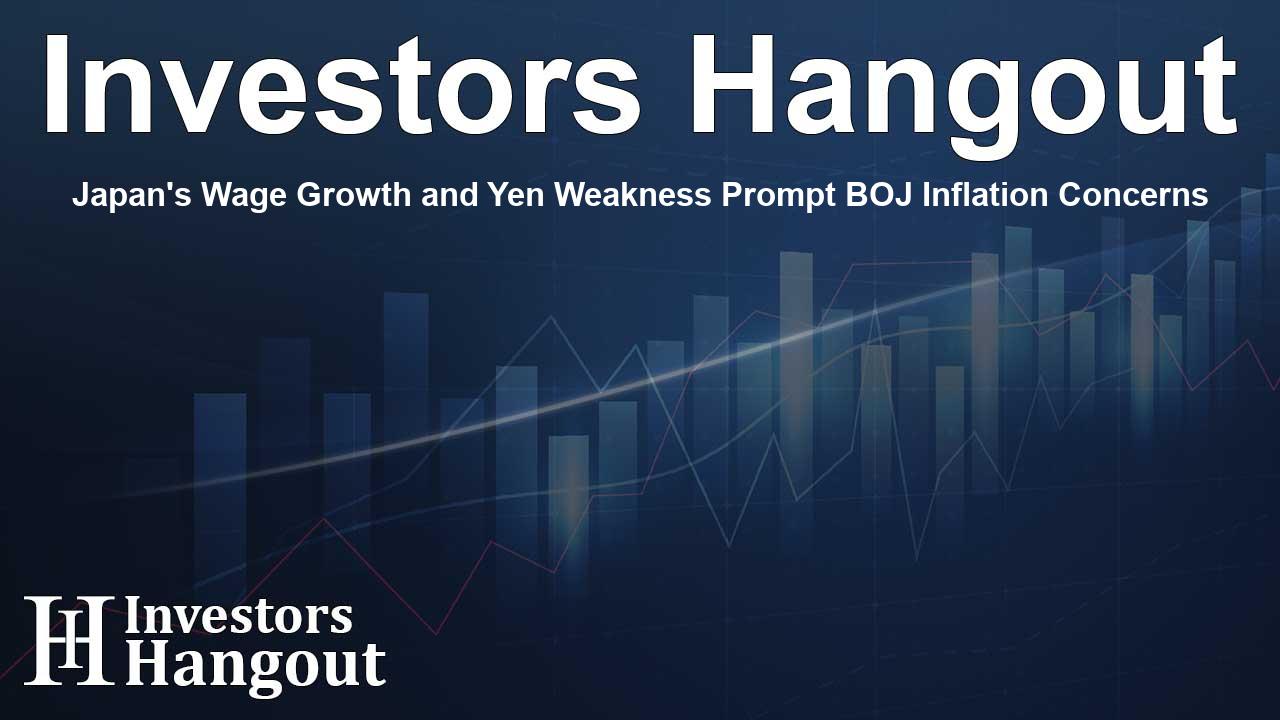Japan's Wage Growth and Yen Weakness Prompt BOJ Inflation Concerns

Japan’s Economic Signals: Wage Growth and Inflation Risks
In recent months, Japan has been witnessing a promising trend of rising wages, which, coupled with the depreciation of the yen, has captured the attention of the Bank of Japan (BOJ). This dynamic suggests an increasing potential for inflationary pressures, prompting considerations for adjustments in the central bank’s price forecasts.
The Impact of Wage Gains on Inflation
The ongoing rise in wages across various sectors in Japan sends a strong signal of economic vitality. Analysts suggest that if these wage increases are sustained, the BOJ might consider an upward revision to its inflation forecast in the near future. However, it’s essential to note that an elevation in the inflation estimate alone does not automatically translate to interest rate hikes.
Temporary Factors and Their Influence
Many sources indicate that if the inflation forecast upgrade results from temporary factors—increasing rice prices and rising import costs due to a weak yen—the BOJ is unlikely to raise rates immediately. Such assessments highlight the importance of understanding the underlying causes of inflation before taking monetary policy action.
Broader Wage Trends and Economic Outlook
Reports suggest that the momentum for wage growth appears strong and widespread, encompassing a variety of businesses regardless of size or sector. This uniform push for higher wages could lay the groundwork for the BOJ's renewed confidence in achieving its 2% inflation target sustainably.
Current Economic Context: Yen Fluctuations and Inflation Rates
Currently, the yen is trading around 158 to the dollar. This value marks a significant decrease from earlier figures of 140 seen in September, pointing to the challenges faced by Japan’s economy. As the yen's value drops, it propels up import costs, adding to inflationary pressures already exacerbated by the rising prices of essential commodities.
Core Inflation and Future Projections
In November, core inflation in Japan accelerated to 2.7%, significantly influenced by the weak yen. The combination of increasing wages and persistent inflation suggests that Japan is on a trajectory to meet its inflation goals, which is a prerequisite for any future interest rate adjustments. The BOJ's forthcoming quarterly growth and inflation forecasts will undoubtedly be critical in shaping monetary policy moving forward.
Looking Ahead: Possible Interest Rate Decisions
Amidst these economic developments, the BOJ will be deliberating over the potential for raising interest rates from the current level of 0.25%. This strategic meeting scheduled for later in January will focus on whether the board views sustained wage growth as indicative of lasting economic strength.
Considerations and Cautions
While the ongoing discussions around wage growth elevate the likelihood of a rate hike, there remains an element of caution. BOJ Governor Kazuo Ueda has signaled a careful approach, particularly in light of external uncertainties. Any unexpected shifts in markets, especially those prompted by upcoming political changes, could influence the BOJ's decision-making process over interest rates.
Frequently Asked Questions
What is the current inflation rate in Japan?
As of November, the core inflation rate has reached 2.7%, primarily driven by a weak yen and rising import costs.
How does the weak yen affect Japan's economy?
The weak yen increases the cost of imports, leading to higher prices for goods, which contributes to inflationary pressures within the economy.
What factors influence the BOJ’s decision on interest rates?
The BOJ considers various elements, including wage growth, inflation rates, and external economic conditions before making decisions on interest rates.
Is the BOJ likely to raise interest rates soon?
There is a possibility of a rate hike depending on whether sustained wages support the inflation target, but caution remains due to uncertainty in global markets.
What is the BOJ's target inflation rate?
The BOJ aims for a sustained inflation rate of 2% to support economic stability and growth.
About The Author
Contact Kelly Martin privately here. Or send an email with ATTN: Kelly Martin as the subject to contact@investorshangout.com.
About Investors Hangout
Investors Hangout is a leading online stock forum for financial discussion and learning, offering a wide range of free tools and resources. It draws in traders of all levels, who exchange market knowledge, investigate trading tactics, and keep an eye on industry developments in real time. Featuring financial articles, stock message boards, quotes, charts, company profiles, and live news updates. Through cooperative learning and a wealth of informational resources, it helps users from novices creating their first portfolios to experts honing their techniques. Join Investors Hangout today: https://investorshangout.com/
The content of this article is based on factual, publicly available information and does not represent legal, financial, or investment advice. Investors Hangout does not offer financial advice, and the author is not a licensed financial advisor. Consult a qualified advisor before making any financial or investment decisions based on this article. This article should not be considered advice to purchase, sell, or hold any securities or other investments. If any of the material provided here is inaccurate, please contact us for corrections.
